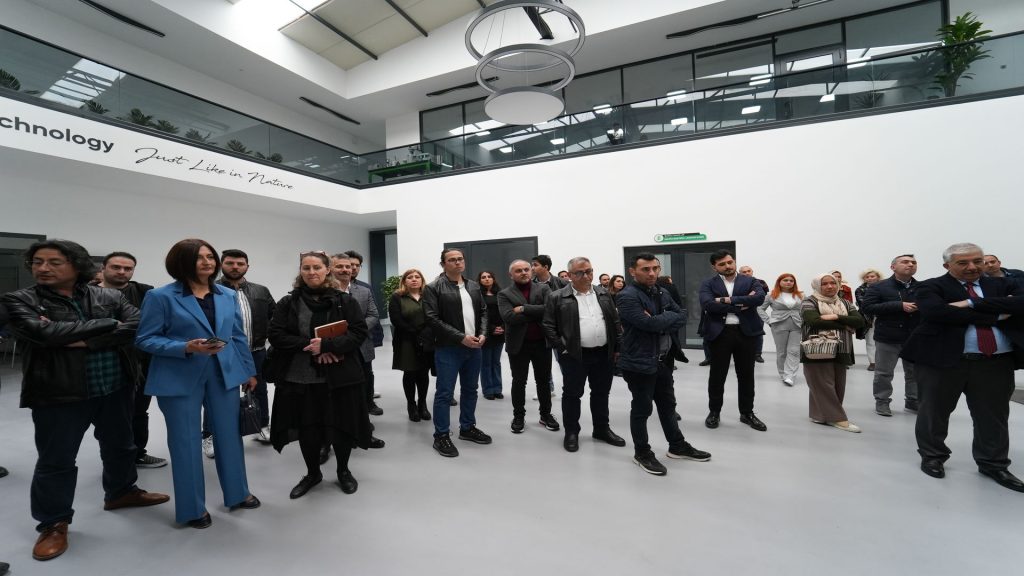Friday April 28, 2023 – Organized by the Association of Mill and Sector Machinery Manufacturers (DESMÜD) in the training hall of Bastak's factory located in Ankara - Kahramankazan, Prof.Dr. Hamit Köksel, Prof.Dr. Mehmet Sertaç Özer and Prof.Dr. The seminar given by Nusret Zencirci attracted great attention by the sector stakeholders.
The seminar, which was attended by participants from Corum, Konya, Ankara, Gaziantep, Bolu and Eskişehir, started with a moment of silence and then the National Anthem was read. Thanking the guests for their participation and interest in the opening speech, DESMUD President Zeki Demirtaşoğlu said that he had been receiving requests for such a seminar for a long time, and that they were only able to do it due to the busy schedules of industry stakeholders.
President Demirtaşoğlu stated that the training series will continue and that they will act in accordance with the demands and needs of the sector related to the issues to be addressed.
1 of the seminar. in the department of Prof.Dr. Nusret Zencirci gave information about the general structure, characteristics, history, classification and types of wheat. Referring to the economic importance of wheat as well as its social, cultural and historical value for our country, Prof.Dr. Nusret Zencirci also stated that wheat is a driving force in terms of the formation and development of cultures.
Prof.Dr. Zencirci stated that wheat was given a sacred value even in the periods before Islam came to Anatolia and reminded that this situation was also seen in the rock relief in Ivriz. Prof. Dr. Zencirci: "The most valuable product related to wheat in Turkey is bread. *Bread has an important place in the food consumption of the Turkish people. Among the bread varieties, there are many more local varieties besides those known by the names of yufka, lavash, tandoor, sac, fetir, kömbe, bazlama, dough-Decanter. Wheat culture in Anatolia is not limited to bread, but also products that find widespread use such as kadayif, yufka, bulgur, couscous, eriş, pasta, keşkek are consumed." he explained.
Prof.Dr. Zencirci shared the information that the first bread produced was probably obtained by baking the dough obtained by mixing roasted or ground cereal grains with water.
At the end of the seminar, Prof. Dr. Hamit Köksel and Prof. Dr. M. Sertaç Özer explained wheat milling, annealing, grinding and sizing processes in detail and the problems experienced in the sector were discussed and solution methods were mentioned in his presentations. Prof. who faced intense questions from the participants. Dr. Hamit Köksel, Prof.Dr. Mehmet Sertaç Özer and Prof.Dr. Nusret Zencirci, they answered all the questions in detail.
Bastak factory trip
During the continuation of the seminar program, the participants who had the opportunity to see the production and quality control departments of Bastak company also got information about the tests conducted in a flour factory.
T.C. Bastak Technology Systems, which is approved by the Ministry of Industry and Technology and is the first and only R&D center of our country, is A. Dec.Ş Kahramankazan has an area of 1000 m2. Mr. Zeki Demirtaşoğlu, who gave information about his company during the trip, stated that Expert Laboratory Services, one of the Bastak Group companies, performs 350,000 tests annually throughout the country with a total of 83 laboratories and has 175 expert engineer personnel.
Stating that 3 million tons of grains, oilseeds and legumes are meticulously classified on behalf of the State of the Republic of Turkey, Mr. Demirtaşoğlu added that they are the largest, first and only TURKAK accredited classifier laboratory.
After the Bastak factory trip, wheat physical analysis tests were carried out as a continuation of the seminar. The density of cereals with Bastak Brand 7500 model hectoliter device, the weight and density of cereals with 7000 model N-Liter, the amount of moisture, one of the most commonly used basic analyses in food processing and control, was examined in cereals, nuts, legumes, oil seeds, feed and feed raw materials with 16000 model moisture meter device.
In the chemical analysis tests performed on wheat, the amount and quality of wet gluten obtained from flour, whole wheat flour, semolina, bulgur, vital gluten and noodles were determined at world standards with Bastak Brand 6100 model gluten washing, 2100 model gluten index and 2500 model dry gluten devices. microbiological+ natural alpha amylase and natural alpha amylase enzymes were detected with the 5100 model Enzyme Meter device.
With the Absograph 500 and Resistograph 500 devices, the rheological properties of dough and the rheological behavior of dough, which is one of the critical parameters for determining the baking value of flour, were determined in international standards with high repeatability, high accuracy, ease of use, remote software update features, and the effect on the quality of the final product was observed.
At the end of the seminar, participation certificates were given to the participants, while the participants expressed their satisfaction with the seminar and expressed that such trainings should continue.








